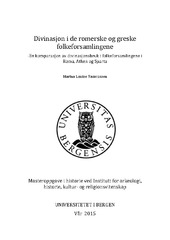| dc.contributor.author | Rasmussen, Marina Louise | eng |
| dc.date.accessioned | 2015-06-15T12:07:45Z | |
| dc.date.available | 2015-06-15T12:07:45Z | |
| dc.date.issued | 2015-05-15 | |
| dc.date.submitted | 2015-05-15 | eng |
| dc.identifier.uri | https://hdl.handle.net/1956/9968 | |
| dc.description.abstract | Temaet for denne avhandlingen er divinasjon og politikk i de tre antikke bystatene Roma, Athen og Sparta. Formålet med avhandlingen er å undersøke Polybius hypotese om at romernes superstitio (inngående frykt for gudene) var årsaken til at eliten dominerte i Roma. Gjennom en komparasjon av divinasjonsbruken i folkeforsamlingene i de tre bystatene, har jeg undersøkt om det var folkets superstitio som hadde betydning for elitens kontroll over folket, eller om det var systemet som bestemte elitens dominans og dermed mulighet for å bruke superstitio og divinasjon som et politisk maktmiddel. Første del består av en gjennomgang av divinasjon i de romerske folkeforsamlingene, der fokus er på hvilken type divinasjon som ble brukt og hvem som utøvde divinasjon. I tillegg er spørsmålene om hvem som hadde kontroll over divinasjonssvarene, hvilke konsekvenser divinasjonssvarene kunne ha, og hvem som bestemte handlingene ut i fra disse svarene, en del av diskusjonen. Neste del består av en undersøkelse av bruk av divinasjon i de greske folkeforsamlingene, der Athen og Sparta blir gjennomgått hver for seg. De samme spørsmålene med hensyn til divinasjonsbruk i forbindelse med folkeforsamlingen blir undersøkt også her. Siste del består av en komparasjon som tar utgangspunkt i funnene i de to foregående kapitlene. I denne sammenligningen kommer det tydelig fram, ut i fra både divinasjonspraksis og handlinger at folket i både Athen og Sparta hadde like mye superstitio som det romerske folket. I alle tre bystatene ble politiske beslutninger påvirket av divinasjon på ulike måter, og divinasjon kunne brukes av eliten som et verktøy i forbindelse med politiske beslutninger. Forskjellen lå ikke i grad av superstitio, men i det politiske systemet som divinasjonspraksisen var en del av. Hvordan divinasjon var en del av folkeforsamlingene og hvordan divinasjon kunne brukes av eliten var avhengig av hvilket type politisk system bystaten hadde, og spesielt hvor mye innflytelse folket hadde i dette systemet. Eliten i Roma dominerte først og fremst på grunn av et system som begrenset folkets mulighet til å påvirke, og elitens dominans over divinasjonspraksisen var en del av dette systemet. | en_US |
| dc.description.abstract | This thesis is a study into divination and politics in the three ancient city-states Rome, Athens and Sparta. The aim of the thesis is to examine the statement made by the Greek historian Polybius that it was the superstitio (scrupulous fear of the gods) of the Romans that made it possible for the elite to dominate politics in Rome. Through a comparative inquiry into the use of divination in popular assemblies in the three city-states, I have sought to answer whether it was the people's superstitio that was the basis of the elite's power over the people, or if it was the underlying system that secured the elite's dominance and their ability to use superstitio and divination as political power tools. The first part of the thesis consists of an exposition of divination in the Roman popular assemblies. Here the focus will be on which types of divination were used and who it was that performed the divination. Other questions that are discussed here include who had control over the divine answers, what consequences these answers had, and who had the power to decide which actions to take according to these answers. The second part discusses the use of divination in the Greek popular assemblies, with Athens and Sparta being discussed separately. Here I have discussed the same issues as in the former part, with regards to which types of divination were used, who performed it, and what the consequences were. The last part of the thesis is a comparative analysis based on the findings of the first two parts. When one looks at both divination practice and the actions of the people in the three city-states, this comparison shows clearly that the people of Athens and Sparta had just as much superstitio as the Roman people. In all three city- states, political decisions were influenced by divination in a number of ways, and the elite in all three city-states could use divination as a power tool in political decisions. The difference between them wasn't in the degree of superstitio amongst the people, but the political system the practice of divination was a part of. The way in which divination was a part of popular assemblies and how the elite could use divination depended on what type of political system the city-state had. In particular it depended on how much influence the people had in the system. The dominance of the Roman elite primarily was a result of a system that limited the people's ability to influence decisions, and the elite's dominance over divination was one part of this system. | en_US |
| dc.format.extent | 1195375 bytes | eng |
| dc.format.mimetype | application/pdf | eng |
| dc.language.iso | nob | eng |
| dc.publisher | The University of Bergen | eng |
| dc.rights | Copyright the author. All rights reserved | eng |
| dc.subject | divinasjon | eng |
| dc.subject | roma | eng |
| dc.subject | athen | eng |
| dc.subject | sparta | eng |
| dc.subject | antikk | eng |
| dc.subject | religion | eng |
| dc.subject | divination | eng |
| dc.subject | politikk | eng |
| dc.subject | folkeforsamling | eng |
| dc.title | Divinasjon i de romerske og greske folkeforsamlingene - en komparasjon av divinasjonsbruk i folkeforsamlingene i Roma, Athen og Sparta | eng |
| dc.type | Master thesis | |
| dc.description.degree | Master i Historie | |
| dc.description.localcode | MAHF-HIS | |
| dc.description.localcode | HIS350 | |
| dc.subject.nus | 713107 | eng |
| fs.subjectcode | HIS350 | |
